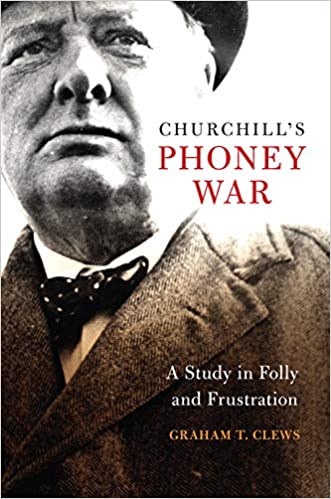
Finest Hour 188
Books, Arts, & Curiosities – Came the Man

November 24, 2020
Finest Hour 188, Second Quarter 2020
Page 47
Review by W. Mark Hamilton
Graham T. Clews, Churchill’s Phoney War: A Study in Folly and Frustration, Naval Institute Press, 2019, 339 pages, £50.50/$44.95. ISBN 978–1682472798
W. Mark Hamilton is author of The Nation and the Navy: Methods and Organization of British Navalist Propaganda, 1889–1914 (1986).
Winston Churchill became First Lord of the Admiralty for the second time at the start of the Second World War in September 1939. As in 1914, when Churchill held the office at the start of the First World War, he presided over the largest naval force on earth. This time, however, he carried deep political scars from the Great War and the Dardanelles. Nevertheless, the Admiralty supposedly signaled all the ships of the Royal Navy: “Winston is back.”
The “Phoney War”—or the “Bore War” as some derisively called it—took place over an eight-month period from September 1939 to spring 1940 and was a naval conflict, with the armies on the continent in gridlock and their air forces frozen. In his memoirs, Churchill termed it the “Twilight War.”

2024 International Churchill Conference
The mortal enemy facing Britain was again Germany, but this time, a war-tested German U-boat fleet was in place. Author Graham Clews is critical of Churchill’s slow response to the submarine danger and argues persuasively that Churchill did not sufficiently understand the threat it represented. There was considerable debate at the Admiralty about how to confront the U-boats—whether to reintroduce the convoy system used in the First War or to activate an aggressive “patrolling school,” which would command surface ships to seek and destroy the submarines. Churchill, after some vacillation, promoted the convoy approach, which Clews says was the better choice.
While Churchill’s main focus was on sea power, which he thought could meet any challenges, he had to work within the constraints of the War Cabinet led by Neville Chamberlain. Clews portrays Churchill as a loyal cabinet member during his months as First Lord, but Chamberlain nevertheless harbored deep suspicions regarding Churchill’s loyalty and motives. Still, Chamberlain allowed Churchill access to the BBC for national broadcasts and did not discourage the First Lord’s correspondence with President Franklin D. Roosevelt, a relationship that began on 11 September 1939, with Churchill’s letters referring to himself as “naval person.” Churchill’s sensitivity to American feelings about the burgeoning war was ever-present, and he opposed heavy aerial bombing early in the war, at least partly to avoid alienating public opinion in the US.
In 1940, the Phoney War took a turn when Germany invaded Denmark and Norway. The attacks took the British and French by surprise. Churchill and the Admiralty had been distracted, concentrating their efforts on preventing a German naval breakout into the Atlantic and attacks on British shipping. They had also thought that the Germans’ sole target would be the Norwegian municipality of Narvik, and not several Norwegian points of occupation. As Churchill observed, the Allied response to the German invasion was “too little and too late.”
The Allies’ failed Norwegian campaign was also the final setback for the already weakened Chamberlain government. Clews conveys the surprise that everyone felt—including Churchill— when the First Lord then became Prime Minister. Realizing that he had been hindered in both the First World War and the beginning of the Second by an inability to make strategic decisions unilaterally, Churchill quickly named himself Minister of Defense.
Clews has written an almost forensic account, and this is not a book for the general reader. It better suits those who seek detailed information on the personalities, decision-making, and strategies of the Phoney War period. The dense writing style is also a problem. To his credit, however, Clews lays out clearly in the book’s introduction a chapter-by-chapter outline of what he intends to achieve. Certainly the book is well-researched, with appropriate photos, maps, an upto-date bibliography, a thorough index, and helpful footnotes.
The Phoney War was a high point in Churchill’s long career, according to Clews, but rather a mix of defeats and accomplishments, including Churchill’s unlikely path to becoming prime minister. Clews concludes that “for Churchill, the Phoney War was a period marked by folly, frustration, and too often, failure.” But the events of late spring 1940 “meant that he was freed from the frustrating politico–military straitjacket of the Phoney War that had confounded him as much as it had his predecessor: his path was clearer, his task was simpler, if much more formidable. The man finally met the moment, and this gave him his finest hour.”
Subscribe
WANT MORE?
Get the Churchill Bulletin delivered to your inbox once a month.


